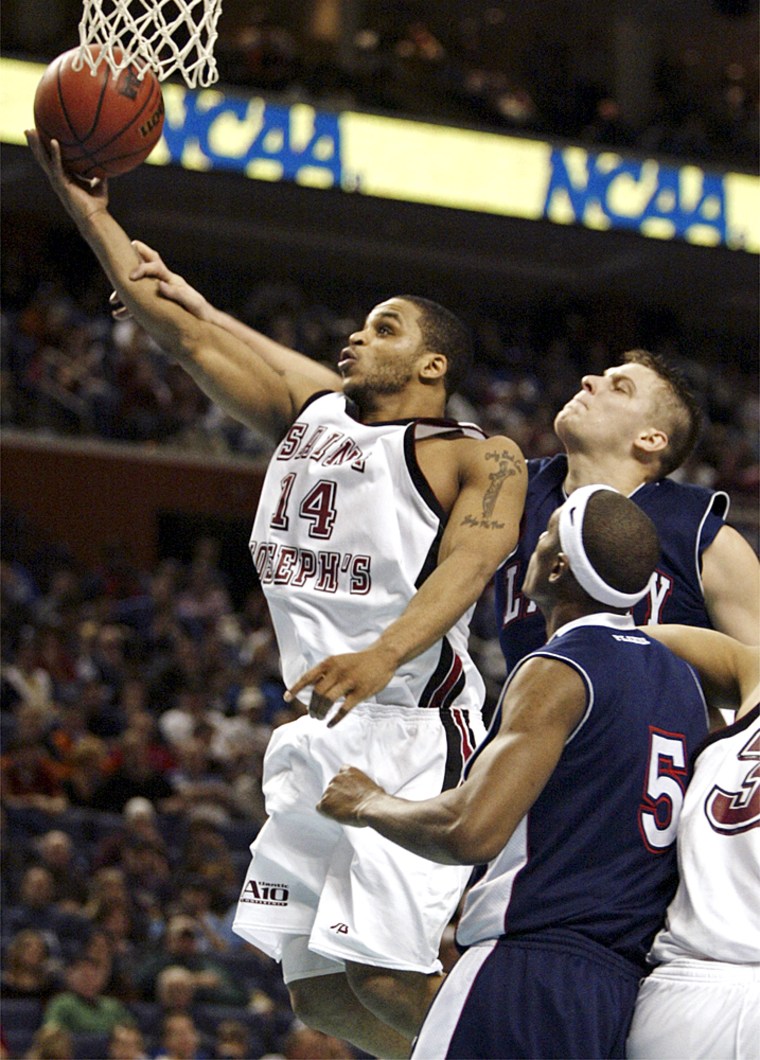Jameer Nelson is the kind of player NBA general managers and coaches say they want. He has four years of college experience, was the consensus college player of the year and won the Wooden and Naismith awards after St. Joseph's held the No. 1 ranking for much of the season and reached the NCAA tournament's Elite Eight.
Yet, Nelson is projected as no better than a mid-to-late first-round pick in Thursday's NBA draft. Less-experienced teenagers, high school seniors or college freshmen and sophomores whose basketball resumes lack Nelson's credentials, will likely be picked ahead of him. At a news conference for the prospective first-round draftees in Chicago two weeks ago, Nelson noted the irony.
"College is a steppingstone. You ought to go to high school, college and then the professionals," Nelson said. "These young guys are in this situation for a reason. They are good athletes. At the same time I see maturity level as a big difference."
Many NBA teams are turning their backs on college seniors in favor of talented college underclassmen, international players and teenagers straight out of high school, even while the league promotes the idea of requiring players be at least 20 years old before entering the draft.
"Our preference is always to have college players with four years of experience," said Washington Wizards General Manager Ernie Grunfeld.
The sentiment is echoed by many other NBA executives. Then why has only one college senior been among the top 10 picks in either of the previous two drafts and why are they not likely to be among the top 10 this year?
Kirk Hinrich from Kansas was the first college senior picked in 2003 (with the 7th pick by the Chicago Bulls) and Melvin Ely was the first in 2002 (12th, Los Angeles Clippers).
Oregon forward Luke Jackson or Brigham Young center Rafael Araujo could be the first college seniors chosen Thursday but are expected to go somewhere in the middle of the first round. Nelson, at 5 feet 11, is considered by some scouts to be too short to compete against NBA-sized guards and could fall to the second round.
"It's a game of follow the leader in the NBA," said one team executive. "Some team is successful with a prep player or international guy and then everyone has to get their own high school or foreign-born player."
Meantime, some very good players may fall through the cracks, said John Nash, the Portland Trail Blazers' general manager.
"I see players like Jameer Nelson and Luke Jackson, being four-year college seniors, closer to be able to contribute today than many of the players regarded as the top prospects," Nash said.
The trend toward younger players is unlikely to end unless the league is successful in implementing an age requirement. Until then, some clubs are trying to find a happy medium; drafting college underclassmen.
Emeka Okafor, a 6-10 junior from the University of Connecticut who helped the Huskies win the NCAA title this year, will probably be the draft's first or second player chosen. A power forward compared to the Detroit Pistons' defensive stopper Ben Wallace, Okafor is the NCAA's seventh all-time leading shot blocker with 441 over three seasons.
Luol Deng, a freshman at Duke last season, is a 6-8 forward who is fast up and down the court, can score from mid-range and is noted for his scoring ability near the basket. Deng was a standout student at Duke and in high school.
Arizona sophomore forward Andre Iguodala is another defensive specialist who also can score. He averaged 12.9 points and shot 45 percent from the floor last season.
Ben Gordon, a teammate of Okafor's at Connecticut, is a 6-3 junior guard. Gordon's stock rose after the Huskies won the NCAA title, but he argues that any differences between college, international and high school players are inconsequential to NBA scouts.
"It's the NBA. They want to see guys who are winners," said Gordon. "It really comes down to your skill level and how you can contribute to the team."
Most of the college players agree that they benefited from their experience in school, even if it was for just a year in some cases.
"The coaches we have at Duke I believe are as good as the coaches in the NBA," said Deng. "They helped me a lot with my game and my weaknesses. The college game itself showed me to focus and got me ready for . . . how disturbing the fans can be. Mentally it helps you a lot."
Some of the college seniors said that they realize there might be a stigma attached to them, but that will just motivate them to work harder and prove the doubters wrong.
"I'm still an underdog," said Nelson, who tested NBA interest as a junior but was told by team executives to stay in school. "It gives me a little chip when somebody out there believes I can't do something that I know I can do."
